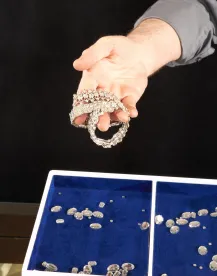A UK court recently fixed a remand hearing in the extradition case of Nirav Modi, a fugitive diamond merchant and the prime accused in a USD 2 billion Punjab National Bank (PNB) fraud case.
After Vijay Mallya (Indian businessman) and Sanjeev Chawla (alleged cricket bookie), Mr. Modi’s case is the third in a series of Indian extraditions that mark a watershed moment for cooperation between Indian and British authorities to bring to justice cross-border corruption.
Background
Mr. Modi, a Wharton business school dropout, grew up in Antwerp, Belgium, a city famed for its cut and trade of luxury diamonds. A third generation jewelry designer, he was the first Indian featured on the cover of Christie’s auction catalogue for a bespoke diamond necklace that sold for USD 3.56 million.
Mr. Modi went on to grace Forbes magazine as one of India’s richest men and joined the ranks of established high jewelry houses, De Grisogono, Boghossian, and Cindy Chao. Prior to his change in fate, actors Kate Winslet, Dakota Johnson, Rosie Huntington-Whiteley and Priyanka Chopra-Jonas, wore his designs on various red carpet, earning Mr. Modi the moniker, “jeweler to the stars.”
PNB Scandal
In February 2018, the Indian Central Bureau of Investigation (CBI), acting on a complaint from PNB, launched an investigation over accusations that Mr. Modi and his partners defrauded the state-owned bank by fraudulently obtaining advances to make payments to overseas suppliers.
Mr. Modi was the “principal beneficiary” of fraudulent letters of undertaking (LoUs) issued as part of the conspiracy to defraud PNB and launder the proceeds of crime. PNB later learned that complicit branch officials increased the amount of the LoUs on SWIFT messages subsequent to routing them through the core banking system to avoid detection.
Arrest, Extradition, and Potential Punishment
In February 2018, soon after being accused of his involvement in the scandal, Mr. Modi fled to the UK prompting a massive public outcry in India. Indian authorities sought his return to prosecute him for his part in the alleged embezzlement from PNB and requested his extradition from the UK.
Pursuant to the India-UK Extradition Treaty (“Treaty”), the UK Home Secretary, Sajid Javid, certified India’s extradition request on March 13, 2019. Days later, Scotland Yard arrested Mr. Modi as he attempted to open a new bank account in Central London.
Under India’s Prevention of Money Laundering Act (PMLA), the maximum punishment Mr. Modi faces in India is seven years’ imprisonment. However, the Treatystates that extradition may be “refused” if the offence is of a “political character.” Whether his defense team invokes this defense is yet to be seen.
Implications
The Ministry of External Affairs (MEA), India’s government body for extradition matters, provides a detailed account of the number of fugitives surrendered from different countries. A response to a 2016 Parliamentary question revealed that India made 15 extradition requests to the UK as of November 2016. So far, as of January 2019, only one fugitive has been extradited from the UK on charges of murder and criminal conspiracy.
India’s failure to secure extraditions since the treaty was signed in 1993 is oft-attributed to administrative and procedural failures. Extradition procedures are complicated by varying documentary and evidentiary requirements between foreign countries. Further, irregularities such as delays in investigation, improper documents, and incorrectly formatted affidavits and certificates, impede an efficient judicial review by foreign courts.
Beyond reinforcing both governments’ mutual understanding and desire to bring fugitives abroad to justice, Mr. Modi’s extradition will have honed India’s understanding of the UK legal system and the standards, documentation, and evidence expected in such cases. This is a step forward for India.




 />i
/>i


